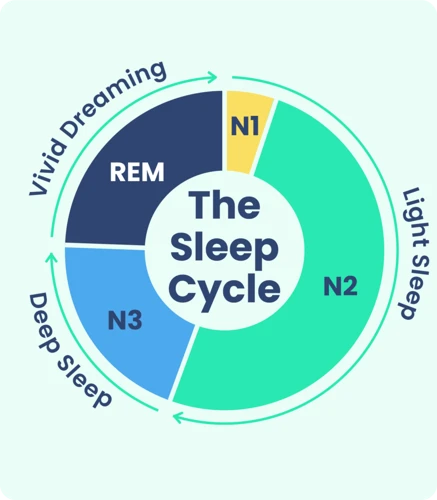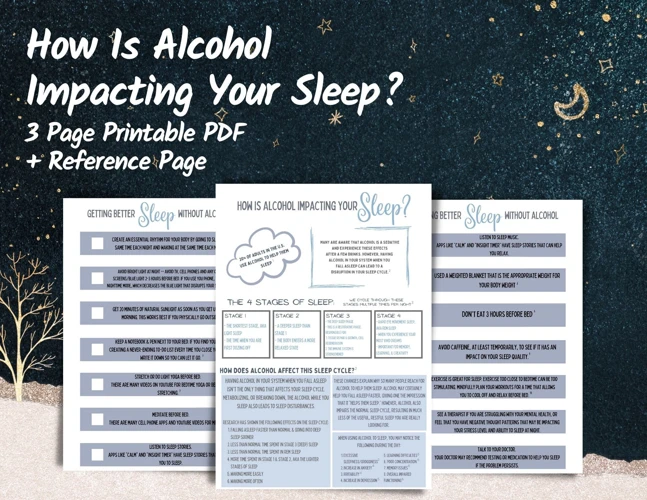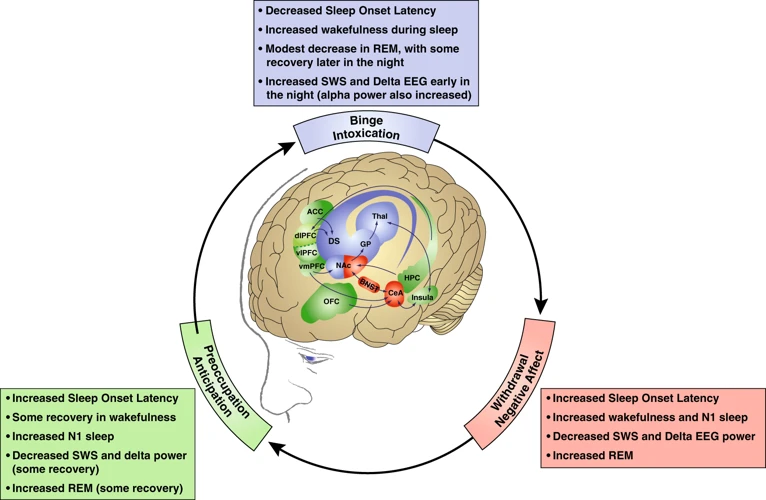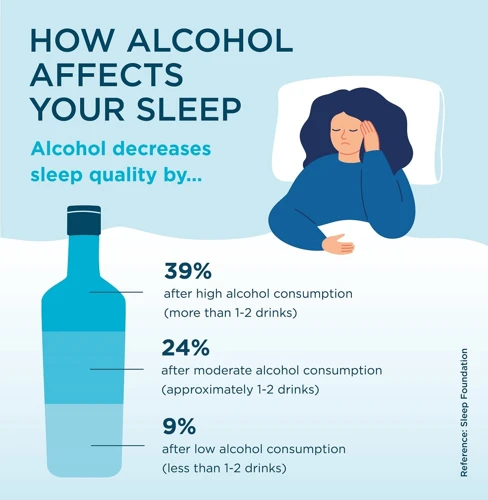The Basics of the Sleep Cycle

Have you ever wondered why we need sleep? While researchers still don’t fully understand all of the reasons, one thing is for certain – sleep is crucial for our overall wellbeing. Our bodies use this time of rest to repair and regenerate, incorporating important processes that help us function optimally during our waking hours. But, what exactly happens when we sleep? Our sleep cycle consists of several stages that work together to help us feel rested and refreshed when we wake up. Let’s dive deeper into the basics of the sleep cycle to understand exactly what happens while we snooze.
What Happens During Each Stage of Sleep?
During a typical sleep cycle, an individual will go through different stages of sleep, each with their own unique characteristics and physiological changes. These stages can be summarized in the following table:
| Stage | Description | Duration | Brain Waves |
|---|---|---|---|
| N1 (Stage 1) | The transition from wakefulness to sleep. Muscle activity slows down and conscious awareness of the environment decreases. | 5-10% of total sleep time | Theta waves |
| N2 (Stage 2) | Deeper sleep, characterized by a decrease in body temperature and heart rate. The brain is less responsive to external stimuli. | 45-55% of total sleep time | Sleep spindles and K-complexes |
| N3 (Stage 3) | The deepest stage of non-rapid eye movement (NREM) sleep. Breathing and heart rate are at their lowest, and it is difficult to awaken the sleeper. | 10-20% of total sleep time | Delta waves |
| REM (Rapid Eye Movement) | A stage of sleep characterized by rapid eye movements, increased brain activity, and vivid dreaming. Muscles are almost completely paralyzed to prevent acting out dreams. | 20-25% of total sleep time | Theta and beta waves |
During a typical sleep cycle, an individual will go through all of these stages several times, with each cycle lasting between 90-110 minutes. As the night progresses, the amount of time spent in REM sleep increases, while the amount of time spent in N3 (deep sleep) decreases. The different stages of sleep play important roles in restoring the body and mind, and disruptions to the sleep cycle, such as those caused by alcohol, can have significant impacts on overall health and well-being.
The Impact of Alcohol on Sleep

As we all know, after a night of drinking, it can be challenging to get a good night’s sleep. While alcohol can initially make you feel sleepy, it has a significant impact on the quality of your sleep. The impact that alcohol has on your sleep cycle is more significant than you may expect. When you fall asleep, your body goes through several stages of sleep, including Rapid Eye Movement (REM) sleep and non-REM sleep. Understanding how alcohol affects these stages is vital to understanding why it affects your sleep quality.
Alcohol’s Effect on REM Sleep
When it comes to how alcohol affects your sleep cycle, one of the most significant impacts is on REM sleep. This is the stage of sleep when most dreaming occurs and is crucial for both cognitive and emotional well-being. Here’s a breakdown of alcohol’s effect on REM sleep:
| Regular REM Sleep | Alcohol-Impacted REM Sleep |
|---|---|
| Typically, REM sleep occurs in the latter half of the night. | Alcohol can disrupt the usual timing of REM sleep, causing it to occur earlier in the night and reducing overall REM sleep time. |
| During REM sleep, the body’s muscles are usually relaxed, but the brain is active. | Alcohol can cause the muscles surrounding the airway to relax too much, potentially leading to snoring and sleep apnea. |
| REM sleep is essential for consolidating new memories and processing emotions. | Alcohol can interfere with REM sleep, making it harder for the brain to perform these vital functions, resulting in mood disturbances, cognitive issues, and other emotional problems. |
It’s worth noting that although alcohol can help people fall asleep quicker and more easily, it can lead to sleep disruptions later in the night, particularly when it comes to REM sleep. So, while having a few drinks might seem like a good way to relax before bed, it can end up causing more harm than good in terms of overall sleep quality.
The Relationship Between Alcohol and Snoring
One of the most common side effects of alcohol consumption is snoring. Snoring can be disruptive not just to the person sleeping next to you, but also to your overall sleep quality. Alcohol can increase the likelihood of snoring by relaxing the muscles in your throat and mouth, causing them to vibrate as you breathe. This can lead to an increase in snoring, as well as more severe cases of sleep apnea.
Sleep apnea is a sleep disorder where breathing pauses or becomes shallow during sleep. Alcohol’s impact on the muscles responsible for keeping the airway open can make sleep apnea symptoms worse. This can lead to a lack of oxygen in the body, causing you to wake up feeling fatigued and groggy.
Snoring can also cause disruptions in your sleep cycle. While snoring itself does not necessarily indicate a problem, it can be a warning sign of an underlying sleep disorder. Chronic snoring can lead to a decrease in sleep quality and increase your risk of other health problems such as hypertension and stroke.
If you find that alcohol consumption is leading to snoring and sleep disturbances, it may be worth considering cutting back on your intake. Reducing alcohol intake can help to reduce snoring and improve sleep quality. It’s recommended to avoid consuming alcohol at least a few hours before bed to give your body time to process the alcohol and reduce its effects on your sleep.
Alcohol and Dreaming

As we delve deeper into the relationship between alcohol and sleep, another aspect worthy of exploration is the effect of alcohol on dreaming. Many of us might have experienced vivid, puzzling, or strange dreams after a night of drinking, but what’s really going on in our brains during these alcohol-induced dream episodes? In this section, we’ll examine the connection between alcohol and dreaming, how alcohol affects the content of our dreams, and why those dreams may seem more intense and memorable than usual.
The Role of REM Sleep in Dreaming
During REM (Rapid Eye Movement) sleep, our brains are most active and we experience vivid dreams. REM sleep is the stage of sleep where our bodies are relaxed and our muscles are paralyzed, allowing our brains to focus on processing information and consolidating memories.
REM sleep typically makes up about 25% of a healthy adult’s total sleep time, and it often occurs in cycles throughout the night. The first cycle of REM sleep usually lasts around 10 minutes, but as the night goes on, the REM cycles can last up to an hour.
Studies have shown that REM sleep is essential for good mental health and cognitive function. It is during REM sleep that our brains are able to process emotions and memories, allowing us to regulate mood and maintain mental well-being.
However, alcohol consumption can disrupt this important stage of sleep. As we mentioned earlier, alcohol can cause us to fall asleep faster and stay asleep longer, but the sleep we get after drinking is often of poorer quality than sober sleep.
One of the ways alcohol can affect REM sleep is by reducing the amount of time we spend in it. REM sleep usually occurs later in the sleep cycle, but when we drink, we are more likely to fall into a deep sleep right away, skipping the earlier stages of sleep and shortening the overall REM cycle.
Alcohol can also disrupt the content of our dreams during REM sleep. Our dreams are often influenced by our deepest desires, fears, and emotions. Researchers have found that alcohol can influence the content of our dreams by suppressing our ability to recall negative memories and increasing our tendency to focus on more positive emotions.
It’s important to recognize the role that REM sleep plays in our health and well-being. By avoiding alcohol before bed, we can help to ensure that our REM cycles are not disturbed, allowing our brains to process emotions and memories properly and ultimately leading to a better night’s sleep.
| REM Sleep | Alcohol Consumption |
|---|---|
| Essential for good mental health and cognitive function | Disrupts the important stage of sleep |
| Allows our brains to process emotions and memories, regulating mood and maintaining mental well-being. | Reduces the amount of time we spend in REM sleep |
| The stage of sleep where our brains are most active and we experience vivid dreams | Can alter the content of our dreams by suppressing our ability to recall negative memories and increasing our tendency to focus on more positive emotions |
How Alcohol Influences Dream Content
Alcohol not only affects the amount and quality of sleep we get, but it can also alter our dream content. Researchers have found that alcohol can have a significant impact on the type and intensity of the dreams we experience. So, how exactly does alcohol influence dream content?
One way is by affecting the brain’s neurotransmitters. Alcohol increases the production of gamma-aminobutyric acid (GABA) in the brain, which has a calming effect and can lead to more frequent dreams. However, it also suppresses key neurotransmitters like serotonin and acetylcholine, which are necessary for regulating REM sleep and certain aspects of dreaming.
Another factor is the time of night when alcohol is consumed. Drinking before bed can disrupt the body’s natural circadian rhythm, leading to more arousals during the night and a greater likelihood of waking up during REM sleep, when dreams occur.
Alcohol can also influence the emotional content of dreams. Studies have shown that alcohol can increase negative emotions, such as fear and anxiety, in dreams. This may be because alcohol disrupts the normal processing of emotions during sleep and REM sleep specifically.
There is also evidence to suggest that alcohol can lead to more vivid and intense dreams. This may be due to the way alcohol affects the brain’s frontal cortex, which is responsible for regulating thought and perception. By altering the activity in this area, alcohol can make dreams seem more realistic and immersive.
It’s clear that alcohol can have a significant impact on our dreams, both in terms of their content and intensity. If you’re someone who experiences troubling or vivid dreams after drinking, it’s important to be aware of how alcohol may be contributing to this and take steps to limit your consumption.
Why Alcohol-Induced Dreams Can Be More Vivid
Alcohol has been known to make dreams more vivid and intense than usual, and this is due to the way it affects the brain during sleep. Alcohol consumption interferes with the normal sleep cycle, suppressing REM sleep early in the night and causing more intense REM rebound later on. During REM sleep, the brain is highly active, and this is when most dreaming occurs.
This disruption in the sleep cycle caused by alcohol consumption can lead to a phenomenon called REM rebound, where the brain makes up for lost time and tries to catch up on REM sleep. This can result in more intense and vivid dreams during the later part of the sleep cycle.
The neurotransmitters that alcohol affects are also responsible for mood regulation, and there is evidence to suggest that changes in these neurotransmitter levels can lead to more intense and complex dream content. Alcohol consumption can also cause anxiety and stress, which can manifest in dream content.
Alcohol-induced dreams can be more vivid due to the suppression of REM sleep early in the night, the subsequent REM rebound late in the sleep cycle, changes in neurotransmitter levels, and the incorporation of anxieties and stress into dream content. It’s important to note that while alcohol may make dreams more vivid, it can also disrupt the quality of sleep and lead to other sleep disorders.
The Connection Between Alcohol and Sleep Disorders

Many people turn to alcohol as a way to unwind after a long day or to help them fall asleep faster. However, what they may not realize is that this habit can actually have negative consequences on their sleep quality and overall well-being. Alcoholism and excessive use of alcohol are linked to a variety of sleep disorders that can disrupt the normal sleep cycle and lead to sleep deprivation. Let’s take a closer look at the connection between alcohol and sleep disorders, and what steps you can take to avoid these issues.
How Alcohol Can Lead to Insomnia
When consumed, alcohol can have a significant impact on a person’s ability to get a good night’s sleep. In particular, it can lead to insomnia, a sleep disorder characterized by difficulty falling asleep or staying asleep.
This occurs due to several factors. Firstly, although alcohol can initially have a sedative effect, it ultimately disrupts the normal sleep cycle. As we sleep, our bodies pass through different sleep stages, including non-REM and REM sleep. Alcohol has been shown to decrease the amount of time spent in both of these stages, leading to more shallow sleep that is less restful.
Additionally, alcohol consumption can lead to nocturnal awakenings, meaning that a person may wake up several times throughout the night, further disrupting their sleep. These awakenings can be caused by factors such as the need to use the bathroom or the body processing the alcohol as it metabolizes.
Alcohol has been shown to have a negative impact on the body’s natural production of the hormone melatonin, which is responsible for regulating the sleep-wake cycle. As a result, this can make it more difficult for a person to fall asleep and stay asleep.
While alcohol may initially make a person feel drowsy, it can ultimately have a significant impact on the quality of their sleep, leading to insomnia and other sleep disorders. Disrupting the normal sleep cycle and decreasing the amount of time spent in both non-REM and REM sleep, alcohol consumption can also lead to frequent nocturnal awakenings and a reduction in the production of the hormone melatonin, making it difficult to both fall asleep and stay asleep.
| Factors Contributing to Insomnia from Alcohol Consumption | Effects on Sleep |
|---|---|
| Disrupts normal sleep cycle | Decreases time spent in non-REM and REM sleep stages |
| Nocturnal awakenings | Waking up multiple times during the night, further disrupting sleep |
| Negative impact on melatonin production | Makes it more difficult to fall asleep and stay asleep |
The Relationship Between Alcohol and Sleep Apnea
Sleep apnea is a common sleep disorder that affects many individuals, and it can be worsened by excessive alcohol consumption. Sleep apnea is characterized by periods of interrupted breathing during sleep, which can significantly disrupt the quality of sleep and lead to a range of health problems.
Studies have shown that alcohol consumption can worsen the symptoms of sleep apnea, especially when consumed close to bedtime. Alcohol is known to relax the muscles in the body, including those in the throat and airway, which can exacerbate the breathing problems associated with sleep apnea.
Alcohol consumption can also decrease the amount of oxygen in the blood, which can further worsen the breathing difficulties experienced by individuals with sleep apnea. This can lead to frequent awakenings during the night and a feeling of fatigue and grogginess the next day, which can have a negative impact on overall wellbeing and quality of life.
It is therefore highly recommended for individuals with sleep apnea to avoid consuming alcohol, especially before bedtime. By reducing alcohol consumption and incorporating other healthy sleep habits, such as maintaining a consistent sleep schedule and sleeping in a comfortable and supportive position, individuals with sleep apnea can improve the quality of their sleep and minimize the negative effects of this sleep disorder on their daily life.
| Alcohol and Sleep Apnea | |
|---|---|
| Alcohol consumption can worsen sleep apnea symptoms | By relaxing the muscles in the throat and airway |
| Alcohol can decrease the amount of oxygen in the blood | Leading to frequent awakenings during the night and feeling groggy the next day |
| Individuals with sleep apnea should avoid consuming alcohol | And adopt healthy sleep habits to improve their quality of life |
Tips for a Better Night’s Sleep Without Alcohol
After learning about the negative impact that alcohol can have on our sleep cycle and dreaming, it may be natural to wonder what steps we can take to improve our sleep without it. While it may seem difficult to fall asleep without the help of alcohol, there are several alternative ways to relax and prepare for restful slumber. By creating a sleep-friendly environment and utilizing relaxation techniques, you can improve your sleep without resorting to alcohol. In this section, we’ll explore some tips for achieving better sleep without alcohol.
Alternative Ways to Relax
When trying to fall asleep without alcohol, it’s important to find alternative ways to relax the mind and body. Here are a few options:
| Method | Description |
|---|---|
| Meditation | Meditation is a practice that involves calming the mind and focusing on breathing. It has been shown to reduce stress and anxiety, which can interfere with sleep. |
| Progressive Muscle Relaxation | This technique involves tensing and relaxing different muscle groups in sequence, promoting relaxation throughout the body. |
| Deep Breathing Exercises | Deep breathing exercises can help slow the heart rate and relax the body. |
| Yoga | Yoga combines physical postures with breathing and meditation, promoting relaxation and reducing stress. |
| Aromatherapy | Using essential oils, such as lavender or chamomile, can promote relaxation and improve sleep quality. |
Finding what works best for you may take some experimentation, but incorporating one or a combination of these techniques into your daily routine can significantly improve your sleep quality. Additionally, creating a consistent sleep schedule and establishing a relaxing bedtime routine can aid in falling asleep naturally without the use of alcohol.
Creating a Sleep-Friendly Environment
Creating a sleep-friendly environment is crucial for getting a good night’s rest without relying on alcohol. Here are some tips on how to make your bedroom a sanctuary for sleep:
- Keep it dark: Darkness promotes the production of the hormone melatonin, which is essential for maintaining a healthy sleep cycle. Use blackout curtains or shades and turn off all electronic devices that emit light.
- Keep it quiet: Noise can be a major disruption to sleep. If you live in a noisy area, consider using earplugs or a white noise machine to block out sounds.
- Keep it cool: Your body temperature drops when you sleep, so keeping your room cool can help facilitate the process. The optimal temperature for sleep is between 60-67°F (15-19°C).
- Keep it comfortable: Invest in a comfortable mattress and pillows that support your preferred sleeping position. Make sure your bedding is clean and cozy.
- Keep it tidy: A cluttered bedroom can create mental unrest, which can disrupt your sleep. Make sure your space is neat and organized before going to bed.
By implementing these tips, you can create a sleep-promoting environment that will help you fall asleep faster, stay asleep longer, and wake up feeling refreshed in the morning.
Conclusion
In conclusion, it is undeniable that alcohol consumption affects the quality and quantity of our sleep. Several studies have shown that while alcohol may help you fall asleep faster, it ultimately disrupts the natural sleep cycle by reducing the amount of REM sleep you get.
Moreover, alcohol can increase the likelihood of snoring and lead to more vivid and sometimes disturbing dreams, leaving you feeling less rested and more fatigued in the morning.
It is important to note that alcohol can also contribute to the development of sleep disorders such as insomnia and sleep apnea. If left untreated, these conditions can have a serious impact on your overall health and well-being.
For those looking to improve their sleep without relying on alcohol, there are various alternative relaxation techniques and environmental changes that can be made. This may include reducing screen time before bed, practicing deep breathing exercises or meditation, and creating a calm and peaceful bedroom environment.
Ultimately, it is up to each individual to decide whether the short-term benefits of alcohol-induced sleep are worth the long-term effects. By understanding the impact of alcohol on our sleep cycle, we can make informed choices that promote restful and rejuvenating sleep, leading to a healthier and happier life.
Frequently Asked Questions
How much alcohol is safe to consume before bed?
It is recommended to avoid alcohol consumption at least 3-4 hours before going to bed.
Does drinking alcohol help you fall asleep faster?
Although it may help you fall asleep faster, it can disrupt the quality of your sleep and lead to insomnia.
Can drinking alcohol lead to sleepwalking?
Yes, alcohol can cause sleepwalking and other sleep-related behaviors.
Do alcohol-induced dreams have any significance?
Alcohol-induced dreams can reflect the emotions and experiences of the individual, but should not be considered as having any special significance.
Can drinking alcohol cause nightmares?
Yes, alcohol can disrupt the quality of REM sleep, which increases the likelihood of having nightmares.
Can alcohol consumption worsen sleep disorders?
Yes, alcohol consumption can exacerbate sleep disorders such as sleep apnea and insomnia.
Does alcohol affect everyone’s sleep in the same way?
No, the effect of alcohol on sleep can vary depending on factors such as age, gender, and individual tolerance.
Can drinking alcohol in moderation have a positive impact on sleep?
No, even moderate alcohol consumption can disrupt the quality of sleep and lead to sleep disorders.
Is it better to have a nightcap or avoid alcohol altogether?
Avoiding alcohol altogether is recommended for a better night’s sleep.
What are some alternative ways to relax before bed other than drinking alcohol?
Some alternative ways to relax before bed include practicing relaxation techniques such as meditation or deep breathing, taking a warm bath, or reading a book.








